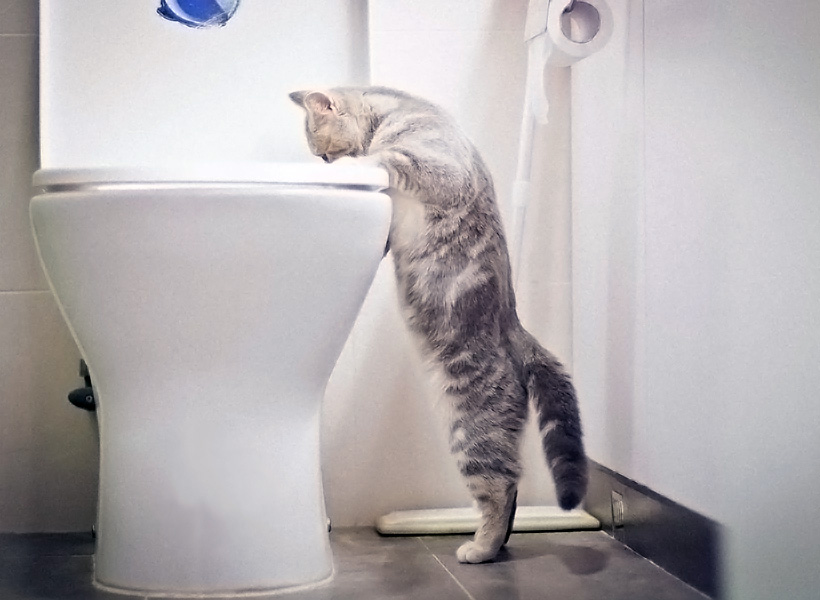Avoid Toilet Emergencies: Never Flush Cat Poop Down Your Toilet - Professional Advice
Avoid Toilet Emergencies: Never Flush Cat Poop Down Your Toilet - Professional Advice
Blog Article
What are your beliefs about Don’t flush cat feces down the toilet?

Intro
As cat owners, it's essential to be mindful of how we take care of our feline pals' waste. While it might seem convenient to purge cat poop down the bathroom, this practice can have detrimental effects for both the setting and human health.
Alternatives to Flushing
Thankfully, there are much safer and much more responsible methods to dispose of feline poop. Think about the adhering to choices:
1. Scoop and Dispose in Trash
One of the most usual method of disposing of pet cat poop is to scoop it into a biodegradable bag and throw it in the garbage. Make certain to use a devoted clutter scoop and deal with the waste promptly.
2. Use Biodegradable Litter
Opt for eco-friendly cat litter made from materials such as corn or wheat. These trashes are environmentally friendly and can be safely dealt with in the garbage.
3. Bury in the Yard
If you have a yard, take into consideration hiding cat waste in a marked area far from veggie gardens and water resources. Make certain to dig deep adequate to stop contamination of groundwater.
4. Install a Pet Waste Disposal System
Purchase an animal garbage disposal system particularly designed for pet cat waste. These systems utilize enzymes to break down the waste, minimizing odor and ecological influence.
Health and wellness Risks
In addition to ecological problems, purging cat waste can also position health and wellness risks to human beings. Feline feces might include Toxoplasma gondii, a parasite that can create toxoplasmosis-- a potentially extreme health problem, specifically for pregnant females and individuals with damaged immune systems.
Ecological Impact
Purging pet cat poop presents damaging microorganisms and parasites right into the supply of water, posing a substantial risk to water ecological communities. These pollutants can adversely influence aquatic life and compromise water top quality.
Final thought
Responsible animal ownership expands beyond giving food and sanctuary-- it likewise entails appropriate waste monitoring. By avoiding purging feline poop down the toilet and choosing alternative disposal methods, we can minimize our environmental footprint and shield human health and wellness.
Why Can’t I Flush Cat Poop?
It Spreads a Parasite
Cats are frequently infected with a parasite called toxoplasma gondii. The parasite causes an infection called toxoplasmosis. It is usually harmless to cats. The parasite only uses cat poop as a host for its eggs. Otherwise, the cat’s immune system usually keeps the infection at low enough levels to maintain its own health. But it does not stop the develop of eggs. These eggs are tiny and surprisingly tough. They may survive for a year before they begin to grow. But that’s the problem.
Our wastewater system is not designed to deal with toxoplasmosis eggs. Instead, most eggs will flush from your toilet into sewers and wastewater management plants. After the sewage is treated for many other harmful things in it, it is typically released into local rivers, lakes, or oceans. Here, the toxoplasmosis eggs can find new hosts, including starfish, crabs, otters, and many other wildlife. For many, this is a significant risk to their health. Toxoplasmosis can also end up infecting water sources that are important for agriculture, which means our deer, pigs, and sheep can get infected too.
Is There Risk to Humans?
There can be a risk to human life from flushing cat poop down the toilet. If you do so, the parasites from your cat’s poop can end up in shellfish, game animals, or livestock. If this meat is then served raw or undercooked, the people who eat it can get sick.
In fact, according to the CDC, 40 million people in the United States are infected with toxoplasma gondii. They get it from exposure to infected seafood, or from some kind of cat poop contamination, like drinking from a stream that is contaminated or touching anything that has come into contact with cat poop. That includes just cleaning a cat litter box.
Most people who get infected with these parasites will not develop any symptoms. However, for pregnant women or for those with compromised immune systems, the parasite can cause severe health problems.
How to Handle Cat Poop
The best way to handle cat poop is actually to clean the box more often. The eggs that the parasite sheds will not become active until one to five days after the cat poops. That means that if you clean daily, you’re much less likely to come into direct contact with infectious eggs.
That said, always dispose of cat poop in the garbage and not down the toilet. Wash your hands before and after you clean the litter box, and bring the bag of poop right outside to your garbage bins.
https://trenchlesssolutionsusa.com/why-cant-i-flush-cat-poop/

Do you enjoy reading about Can You Flush Cat Poop Down The Toilet?? Place a remark down below. We would be glad to listen to your responses about this blog. We hope that you come back again soon. Sharing is caring. One never knows, you may just be helping someone out. Thank-you for going through it.
Call Today Report this page